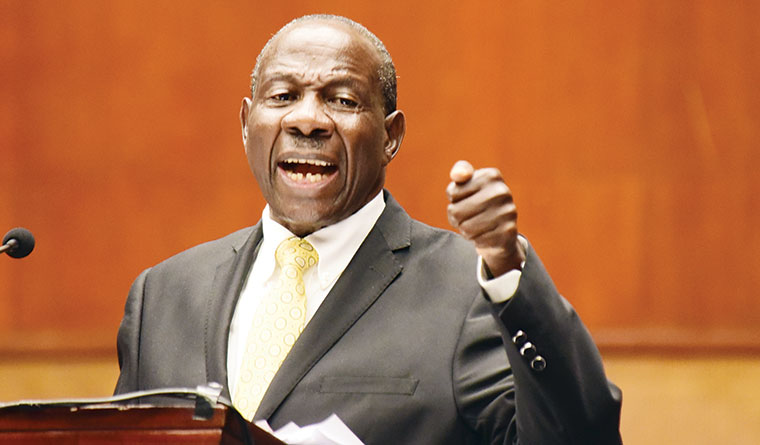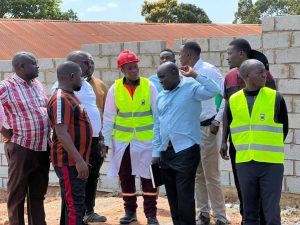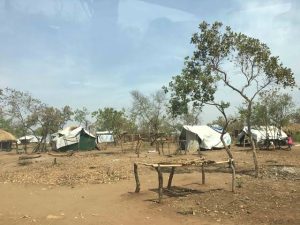Lack of Jobs Cost Many Incumbents- Finance Minister Kasaija
4 min read
Unemployment was one of the major obstacles to many incumbents in the just concluded elections, the Finance, Planning and Economic Development Minister, Matia Kasaija has revealed. He was officiating at the groundbreaking ceremony for the first Public Free Port Zone at Entebbe International Airport on Saturday.
He noted that unemployment has been a key challenge across the country and that it contributed greatly to the defeat of several incumbents in parliament. Over 20 ministers including the vice president and Bukoto Central MP, Edward Ssekandi, the Government Chief Whip, Ruth Nankabirwa (Kiboga woman MP), Rosemary Sseninde (Wakiso Woman MP) and Kasirivu Atwooki (Bugangaizi West County) lost their parliamentary seats in the recent polls.
Several incumbents from the ruling National Resistance Movement –NRM such as Jalia Bintu ( Masindi woman MP), Ernest Kiiza (Masindi municipality) and Patrick Kasumba (Bujenje) also lost their seats.
The others are Joy Atim Ogom (Lira City Woman MP), Sylvia Akello (Otuke woman MP), Doreen Amulle (Amolatar woman MP), Beatrice Anywar (Kitgum Municipality) and Paul Amoru (Dokolo North County) also their seats. Kasaijja says the biggest challenge for incumbents, particularly in Bunyoro sub region was high youth unemployment.
Kasaija is voicing the concerns of some of the voters in Bunyoro, who have asked the newly elected leaders to put more attention on improvement of health services, agriculture, job creation, fight corruption, land grabbing and improve education standards among others in the next five years.
These problems, including unemployment, are widespread in the country. Paul Amoru, the Dokolo North County legislator, who lost his seat, agrees with Kasaija, saying that apart from propaganda and tribalism, he also faced a lot of pressure from the youth who seem dissatisfied with the poverty alleviation efforts.
“Government needs a clear policy on how best to handle this. Because there is no straight answer to it,” he said. He also although funds have been injected in job creation and income-generating initiative, they haven’t produced the desired results. “Most times it is taken for political patronage and sometimes the technical people at the district are not happy. So groups that come up are not genuine. They are just formed to extract some of these resources and it is misused,” he said.
As a result, Kasaija urges leaders in public and private sectors to prioritize job creation in the coming years. He says the best way to create jobs is through industrialization and commercializing agriculture.
He notes that the ongoing construction of the first free port zone at Entebbe International Airport is one of the avenues of creating more jobs. The zone is expected to create at least 240 jobs once it is in operation.
The free port zone project, overseen by Uganda Free Zone Authority and built by National Enterprise Corporation-NEC, will cost Shillings 47 billion. Upon completion, it will host seven production units, a trade house that will house offices for Uganda Revenue Authority and UFZA among others to facilitate smooth operations in the zone.
Some of the activities expected to take place in the zone include warehousing, storage, packing, repacking, simple assembly, labelling of agro and mineral products. Uganda exports mainly gold, coffee, dried legumes and fish among others. The total value of these exports was US$3.6 Billion in 2019 up from US$ 2.2 billion in 2015.
Kasaija believes that the activities in the free port zone will further boost Uganda’s export volumes because the products will be exported via Entebbe Airport. According to the Uganda Free Zones Act, 2014, a free zone is a designated area where goods introduced in that area are exempt from import duties and taxes. They include export processing and freeport zones.
A free zone may only, however, “be established at a lake, river port, airport, border point or a place with similar geographic or economic advantage”. In 2018, Uganda Civil Aviation Authority-UCAA donated 5 acres to Uganda Free Zone Authority-UFZA to build a free port zone at the airport.
The UFZA Executive Director, Richard Jabo and Lt. Gen. James Mugira, the Managing Director National Enterprise Corporation-NEC signed a memorandum of understanding in July 2020 to build the initial phase of the free port zone at the airport. In September last year, UFZA handed over the construction site to the NEC, the commercial arm of the Uganda People’s Defense Forces-UPDF.
NEC is expected to complete construction of the first phase within six months. Kasaija has urged the UFZA staff and board of directors, Ubuntu Consulting Limited, the Supervising consultant and NEC to “ensure the project is completed in time to enable Ugandan to harness the benefits of this investment.”
URN





